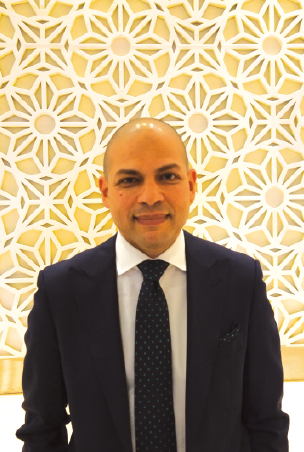
Shelf Drilling’s associate general counsel for the Middle East and Africa discusses the changing role of in-house counsel and the effect of technology on the profession.
Asian-mena Counsel: Can you describe your professional background and your current role?
Hani Samra: I am an Egyptian lawyer with more than 15 years of in-house experience in the oil-and-gas sector. I am currently assuming the role of associate general counsel of Shelf Drilling for the Middle East, Africa and Italy. Shelf Drilling is a major offshore drilling service contractor headquartered in Dubai, UAE. The role involves working with senior management to manage the legal risks associated with the company’s offshore drilling contracts and corporate finance transactions. In the meantime, I am actively working on an AI-powered project in Silicon Valley and am hoping this initiative turns into a commercially feasible project.
AMC: How big is the team you manage and how is it structured?
HS: We are a small size team of five lawyers. The team is headed by the vice-president and general counsel. Two associate general counsel report to the VP, with two junior lawyers assisting them in the day-to-day legal and corporate work.
AMC: What are the biggest challenges you face in this role?
HS: The oil-and-gas business is cyclical, with uncertainties due to market fluctuations and changing macroeconomics. In some business cases, taking a standard approach to managing certain legal risks may not be the best solution that would help management solve the problem. Sometimes we need to think of other innovative ways of managing certain legal risks to enable management to come up with the best commercial decision given the circumstances and market conditions.
AMC: What are the most important qualities of a good general counsel?
HS: We are living in the golden age of digitalisation and automation of almost all major industries. A good general counsel must be conscious to this fact no matter what industry she is in and needs to make sure that her team and resources are capable to provide innovative solutions to the legal issue at hand in a time- and cost-effective manner.
AMC: How is technology such as AI changing the way legal industry works?
HS: Since my visit to the Codex Institute at Stanford Law School in 2015, I realised that automating the legal industry is the most important thing happening in the legal space right now. This is a fact that every lawyer (whether in-house or at a law firm) must be conscious of. Artificial intelligence is increasingly making a significant impact on the way the legal industry works. Now, machines are performing some lawyers’ tasks with a high level of accuracy, very close to a lawyer-like output or even better. AI branches such as machine learning and natural language processing are being used in many successful legal applications in contract analytics, legal research, e-discovery, self-service compliance and outcome prediction.
AMC: How will AI shape the future of legal services?
HS: The use of AI in the legal industry is increasing and scalable every day. This is because AI works on historical data and learns from it to perform the desired human-like outcome. The legal industry is very rich with data and is a perfect fit for AI deployment wherever it is possible to provide automated solutions to mechanistic or repetitive tasks or to predict an outcome. This increasing deployment of AI-powered applications will enable law firms to provide cost- and time-effective legal services to their clients and legal departments to provide innovative solutions to their management. Overtime legal AI will be a label of quality assurance for law firms and legal departments. Clients and management will ask whether a law firm or legal department uses legal AI in providing their services. Administrative and paralegal jobs will disappear or be significantly re-defined over time. Access to justice will be cheaper. The increasing use of AI will also prompt law schools to teach law students data science and machine learning besides law. This will create a new generation of lawyers capable of dealing with and managing AI to optimise efficiency and costs of legal services.
AMC: Will AI replace lawyers in the future?
HS: No. However, AI will take over admin and repetitive tasks so that lawyers will be dedicated to cerebral tasks. As the level of accuracy of AI output increases, lawyers will be dedicated to more strategic thinking and bringing more added value to clients at lower costs.
AMC: What advice can you give to young lawyers starting out in their careers today?
HS: Get educated on data science and machine learning and watch how legal AI is being deployed. Think of any legal problem and see how this legal problem can be automated.
AMC: What skills should they aim to acquire and what are the most promising areas of practice to focus on?
HS: In my opinion, the most important skill that any young lawyer should have for success is the ability to innovate and provide creative solutions to legal problems. Learning how to be innovative is not hard. A young lawyer needs to constantly engage her mindset in the approach of finding other ways of solving the problem.
AMC: What is your hinterland — what are your interests outside of the legal profession?
HS: Machine learning and data science, where I am planning to launch my legal AI startup in the future. That is my dream.
 Hani Samra is currently assuming the role of associate general counsel of Shelf Drilling for the Middle East, Africa and Italy, based in Dubai. He has more than 15 years of experience with a focus on oil-and-gas and corporate finance. He held previous regional roles with Schlumberger and Transocean, covering various countries in the Middle East, Africa, Europe and Asia. Since 2015, Hani has been actively engaged in the legal technology and innovation space, and is currently working on his own initiative of cognitive development and legal AI platform in Silicon Valley.
Hani Samra is currently assuming the role of associate general counsel of Shelf Drilling for the Middle East, Africa and Italy, based in Dubai. He has more than 15 years of experience with a focus on oil-and-gas and corporate finance. He held previous regional roles with Schlumberger and Transocean, covering various countries in the Middle East, Africa, Europe and Asia. Since 2015, Hani has been actively engaged in the legal technology and innovation space, and is currently working on his own initiative of cognitive development and legal AI platform in Silicon Valley.















